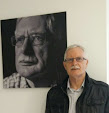This contrerime is subtitled Eléphant de Paris. The episode is humorous, one can imagine Toulet and Curnonsky emerging from their "bain de cuir" as Toulet liked to call the comfortable Weber bar he frequented for most of the night, into the Paris dawn, and stumbling upon an unmissable pachyderm, which, none too sober, they tried to take home....
Ah, Curnonsky, non plus
que l' aube,
N' était bien rigolo.
Il regardait le fil de l'
eau.
C' était avant les Taube.
Et moi j' apercevais -
pourtant
Qu' on fût loin de
Cythère -
Un objet
singulier. Mystère :
C' était un éléphant.
Notre maison étant tout
proche,
On le prit avec nous.
Il mettait, pour chercher
des sous
Sa trompe dans ma poche.
Hélas,
rue-de-Villersexel,
La porte était trop
basse.
On a beau dire que tout
passe.
Non - ni le riche au ciel.Curnonsky, as sober
as the nascent dawn
was watching the Seine.
This was before the Taubes.
When I, more observant -
though a long way from Cythera –
saw a curious enigma,
a veritable elephant.
The house where we bunk
was near. So we took it
as it rifled my pocket
with its mendiant trunk.
Alas, Villersexel street,
where the door was too low.
‘Tis said all will go through -
not the rich nor replete.
Notes: The Taube was a fast German plane monoplane of the 1914-1918 was (taube=pigeon).
Cythères : The Greek island, no doubt an allusion to Baudelaire's poem : Un voyage à Cythères:-
Cythère n'était plus qu'un terrain des plus maigres,
Un désert rocailleux troublé par des cris aigres.
J'entrevoyais pourtant un objet singulier!
Ce n'était pas un temple aux ombres bocagères,
Où la jeune prêtresse, amoureuse des fleurs,
Allait, le corps brûlé de secrètes chaleurs,
Entrebâillant sa robe aux brises passagères;
Mais voilà qu'en rasant la côte d'assez près
Notes: The Taube was a fast German plane monoplane of the 1914-1918 was (taube=pigeon).
Cythères : The Greek island, no doubt an allusion to Baudelaire's poem : Un voyage à Cythères:-
Cythère n'était plus qu'un terrain des plus maigres,
Un désert rocailleux troublé par des cris aigres.
J'entrevoyais pourtant un objet singulier!
Ce n'était pas un temple aux ombres bocagères,
Où la jeune prêtresse, amoureuse des fleurs,
Allait, le corps brûlé de secrètes chaleurs,
Entrebâillant sa robe aux brises passagères;
Mais voilà qu'en rasant la côte d'assez près
Pour troubler les oiseaux avec nos voiles blanches,
Nous vîmes que c'était un gibet à trois branches,
Du ciel se détachant en noir, comme un cyprès.
Nous vîmes que c'était un gibet à trois branches,
Du ciel se détachant en noir, comme un cyprès.
On a beau dire que tout
passe. Allusion to an old medieval expression : "tout passe, tout lasse, tout casse". And of course the camel and the eye of the needle.
Curnonsky was of course the pseudonym of
Maurice Sailland de la Daguenière (1873-1956) . Toulet and he shared a lodging in Paris*, and
together lived the bohemian life of the Right Bank. Also shared a trip to the
Far East. At the time a
contributor to periodicals, and co-author with Toulet of some meretricious wrote novels, Curnonsky eventually became a renowned French gastronome. He left many books on
food, including the famous Vins et cuisine de la France. Their friendship did not survive Toulet’s departure from Paris. Mind you, Toulet. is said to have owed Curnonsky a considerable sum of money, into 6 figures in today’s terms – €400,000 according to Martinez. Toulet gets scant mention in Curnonsky's memoirs.
He died by falling from a window in his house in Paris.
*Léon Daudet noted in his Salons et Journaux, that "Curnonsky et Toulet habitaient ensemble... Quand on tombait chez eux vers midi, ils étaient encore couchés dans deux chambres voisines,également pleine de bouquins et chacun d'eux lisait le Dictionnaire de Bayle. Il est vrai qu'à la fermature du Weber ils avaient gagné le bar du café de la Paix, jusque vers les trois heures du matin"
Toulet himself, as recorded by Jacques Dyssord, said :"Nous habitions dans cette rue de Villersexel où j’ai passé mes plus belles années de Paris –
les moins sinistres du moins – une rue pour chanoines et dames patronnesses qui
donnait sur le Boulevard Saint-Germain. La concierge fut longtemps à se faire à
nos habitudes de noctambulisme. Nous la forcions à se lever une heure environ
plus tôt qu’elle ne l’eût souhaité… Léon Daudet venait nous sortir du lit vers
quatres heures de l’après-midi…."

No comments:
Post a Comment